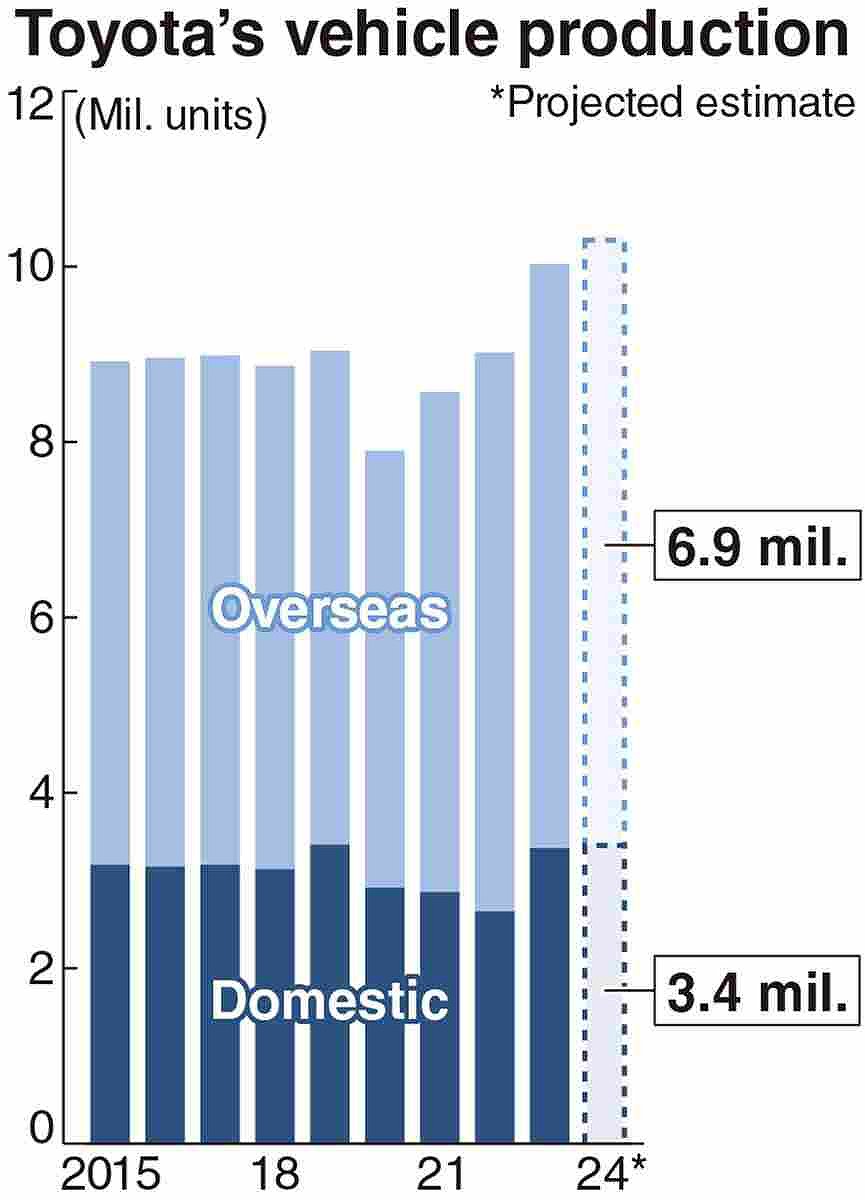Toyota to Allow Laxer Working Environment in Factories by Cutting Operation Hours Amid Testing Scandals

17:52 JST, February 2, 2024
Toyota Motor Corp. plans to reduce the maximum operating hours of its final assembly plants in Japan by 30 minutes in principle in fiscal 2024 in wake of performance-test irregularities in the group.
The automaker intends to ensure quality by allowing more leeway at its factories. It also plans to revise its development plan for new vehicles in order to create an environment more flexible to its workers.
Toyota plants normally operate two shifts a day, each about eight hours plus overtime. The upper limit of operating hours for each line is set based on the production plan. The upper limit for overtime will be shortened by 30 minutes in the planned work-hour reduction.
The new rules are to be applied when factory employees work overtime to produce popular vehicles, among other situations. It is unusual for the firm to reduce operating hours when there are no production disruptions such as parts shortages.
The extra 30 minutes will allow workers to go home early or use the time for equipment inspections or training. However, in the event of a major delay in production due to machine breakdowns or natural disasters, Toyota may choose not to enforce the 30-minute reduction.
Toyota’s production is growing amid the easing semiconductor shortage. Number of vehicles produced per day domestically has risen to nearly 15,000 on some days. “Employees work feeling under pressure of very tight schedules,” a source said.
To improve the situation, the upper limit for fiscal 2024 will be set at about 14,000 units per day to create more leeway at factories. Still, Toyota’s global production is projected to reach a record high of about 10.3 million units in 2024. It will add production lines to factories that are less busy among other measures to effectively respond to strong demands for popular vehicles.
The company has also begun reviewing its development plan. Because tight development schedules were an indirect cause of the irregularities, it is considering delaying development schedules for new models, emphasizing on more leeway for employees. For that purpose, Toyota is expected to allow about a 10% drop in group sales from 11.23 million units last year.
Toyota subsidiary Daihatsu Motor Co. was forced to suspend shipments of all its models in December after it was found to have fraudulently obtained its safety certifications. On Jan. 29, Toyota Industries Corp., to which Toyota outsources diesel engine production, was also found to have committed irregularities and has suspended shipments of some models since. By shortening operations, Toyota hopes to also give leeway to its subsidiaries and parts suppliers.
Top Articles in Business
-

Prudential Life Insurance Plans to Fully Compensate for Damages Caused by Fraudulent Actions Without Waiting for Third-Party Committee Review
-

Narita Airport, Startup in Japan Demonstrate Machine to Compress Clothes for Tourists to Prevent People from Abandoning Suitcases
-

Japan, U.S. Name 3 Inaugural Investment Projects; Reached Agreement After Considerable Difficulty
-

Toyota Motor Group Firm to Sell Clean Energy Greenhouses for Strawberries
-

SoftBank Launches AI Service for Call Centers That Converts Harsh Customer Voices into Softer Voices
JN ACCESS RANKING
-

Japan PM Takaichi’s Cabinet Resigns en Masse
-

Japan Institute to Use Domestic Commercial Optical Lattice Clock to Set Japan Standard Time
-

Israeli Ambassador to Japan Speaks about Japan’s Role in the Reconstruction of Gaza
-

Man Infected with Measles Reportedly Dined at Restaurant in Tokyo Station
-

Videos Plagiarized, Reposted with False Subtitles Claiming ‘Ryukyu Belongs to China’; Anti-China False Information Also Posted in Japan























